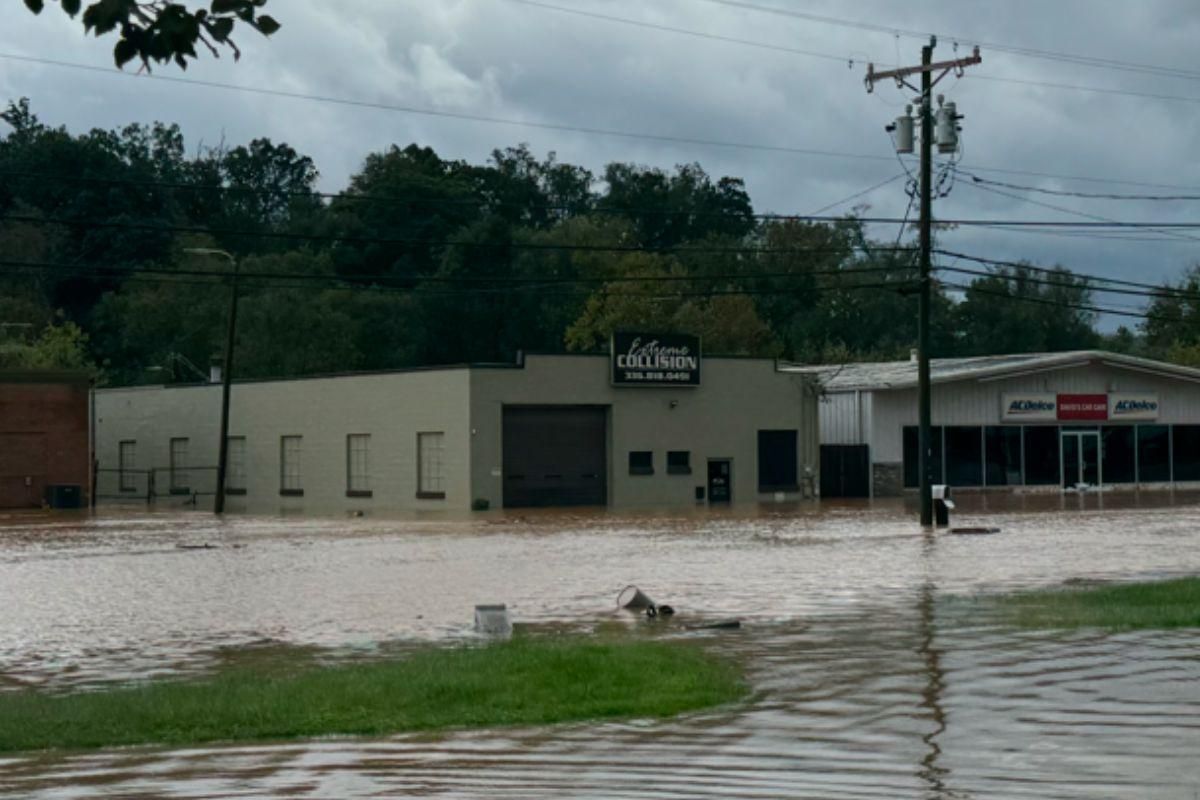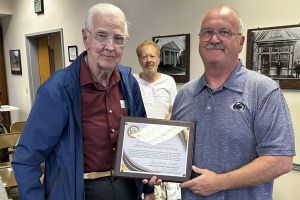Extreme Collision Center backs up to a river in a low-lying area. So, when Hurricane Helene swept through North Carolina in late September, the shop was in the perfect place for flooding. Colby Eller, who co-owns the North Wilkesboro-based business with his brother, Adam, remembers the aftermath well.
“We were kind of southeast of the hurricane -- the main path it took,” Eller told Autobody News. “Everything up in the Asheville area -- they got a lot worse than us. We were blessed on that end of it. But at the same time, you know, we're right on a river here. It's called the Yadkin River. And when something like that happens, that river comes out of its banks, so we had about five feet [of water] inside of our shop during the heaviest parts of it.”
The shop sustained considerable damage and loss but was able to open back up. Its industry connections, Eller explained, made that possible.
Loss and Cleanup After the Storm
The business is a full collision center; it began in 2009 in a residential garage, which it gradually outgrew. By 2014, the business was doing insurance work, and by 2020, the shop had moved to town, Eller said. At this point, the work is prolific and varied; the shop, with its four employees, moves about 30 cars through each month.
“We work on foreign and domestic vehicles, and we work with all insurance companies,” he said.
The area, he said, is quiet and somewhat rural. North Wilkesboro is situated about 100 miles northeast of Asheville.
Back in September, as the river surged, employees evacuated the business, Eller said. They moved all the vehicles out to higher ground and tried to put all tools and equipment on top of toolboxes, away from the water they knew would rise. They thought they’d done enough, but they were wrong.
“There's no way it's gonna get this high,” Eller recalled thinking. “And then, it ended up surpassing those expectations.”
When they returned, Eller estimated, they found 3 or 4 inches of sludge throughout the building with a jumbled mess to accompany it.
“Everything was washed to the back of the shop, all in one room -- all the trash cans, everything you can imagine just thrown together,” he said. “All our office supplies, printers -- I mean, everything.”
The team swung into action as soon as they could.
“Day one, when the water receded, me and my employees hit the ground running,” Eller said. “We started getting everything out -- pressure washing floors, throwing away stuff, having Dumpsters emptied three or four times a week. And we just started rebuilding a little bit.”
Neighboring businesses in the area took a hard hit too, he said, and the shop cleanup process took weeks with lots of loss along the way.
“They all got it, so I mean, it was just a bad deal, but we worked at it for around three weeks, and we were able to open back up,” he said. “We're still finding stuff that was left in a drawer here or there, and it doesn’t work anymore.”
Income suffered, too.
“We were actually out of commission for around four weeks before we started making any money back,” Eller said. “That's a big loss. I mean, we do around $100,000 to $140,000 a month here. You've lost that income plus what you've lost in tools and everything else.”
‘An Obligation to Help’
For Eller, the situation drove home the importance of having a network. Extreme Collision Center is a Carolinas Collision Association (CCA) member, and that organization began helping quickly. CCA Executive Director Josh Kent paid a visit to the shop right after the hurricane.
“[Kent said] ‘Hey, what can I help you guys with? Can we get shops together to do anything?’ And he had a lot of great resources,” Eller said.
Other organizations like All Pro Collision Equipment stepped in with free replacement equipment, like a new MIG welder and a heat conduction unit, along with a low-cost non-resistant spot welder. Another shop kicked in new TV monitors.
“It was just a large help. It felt like a family coming together to make something happen,” Eller said.
At this point, the shop is back up and running at full steam. The shop got hit badly, Eller acknowledges, but not as badly as some of the Asheville homes and businesses that are still in recovery mode.
“I think we're pretty well set to go forward from here,” he said. “We're back running at full steam.”
The CCA also raised money from its members and members of other state associations and donated to Operation Anchor and Hearts and Hands, two nonprofits helping with relief efforts, Kent said, and it donated items to those in need in hard-hit Marshall, NC.
Kent remembers visiting other shops in the hurricane’s aftermath -- just showing up to see what they needed.
“That’s part of being an association is we’re supposed to be there for our members for the good and bad times,” he said. “When something like that happens in our state, I feel like we have sort of an obligation to help.”













